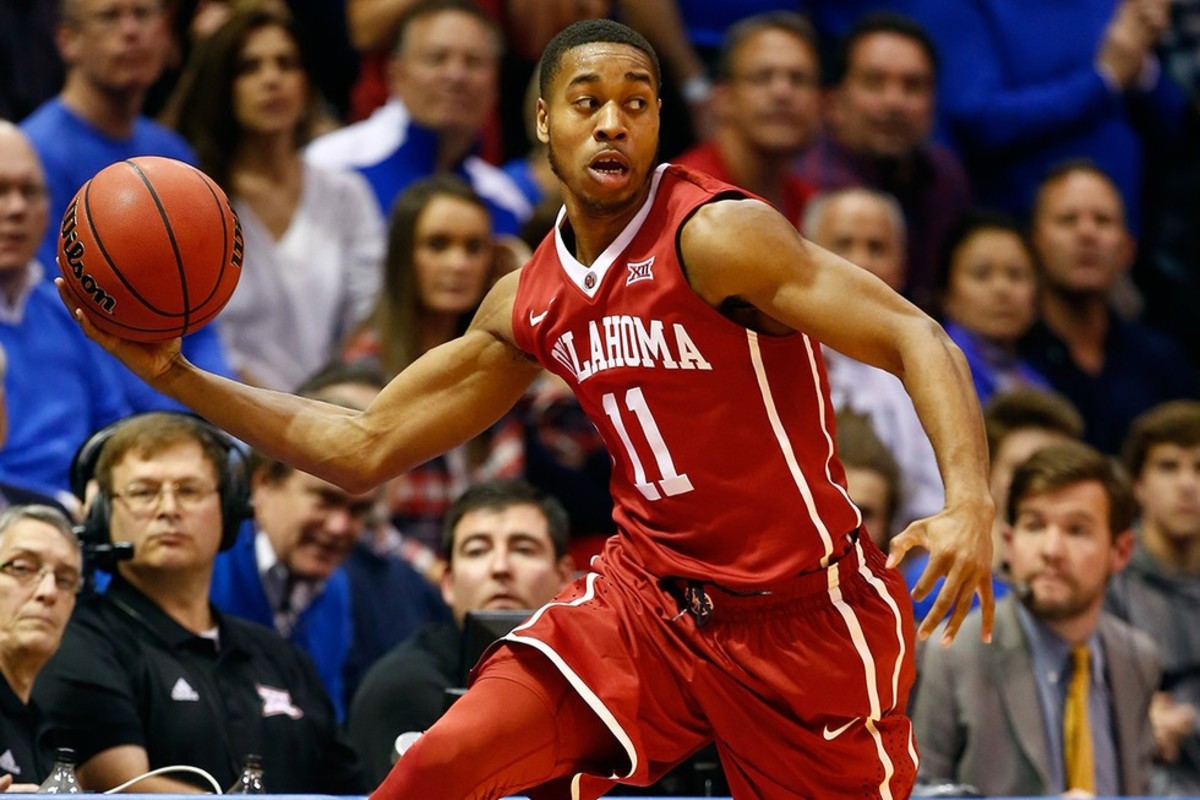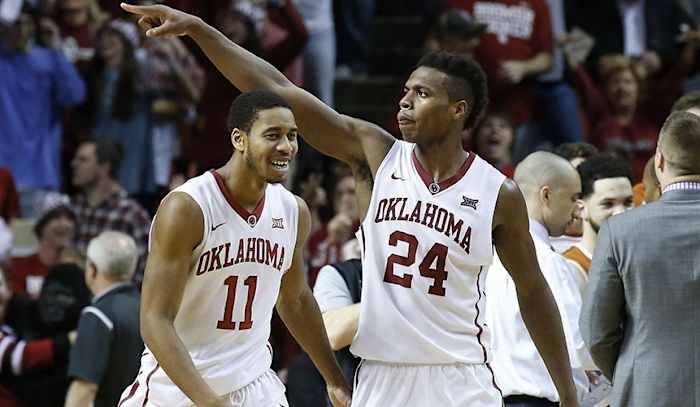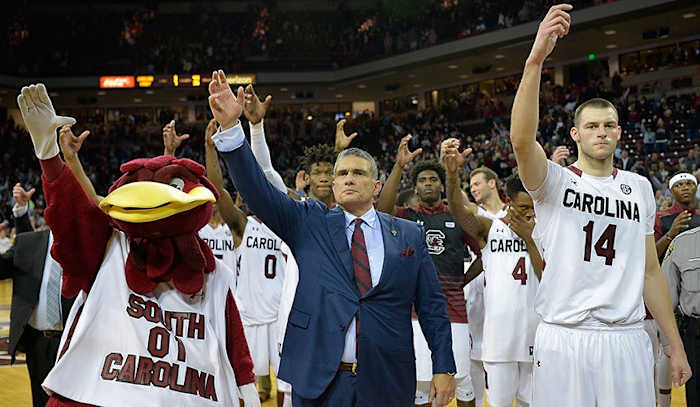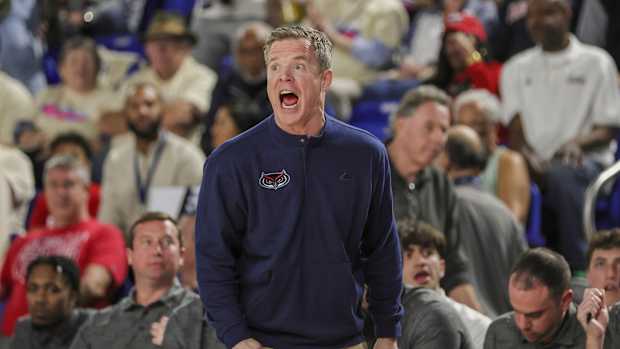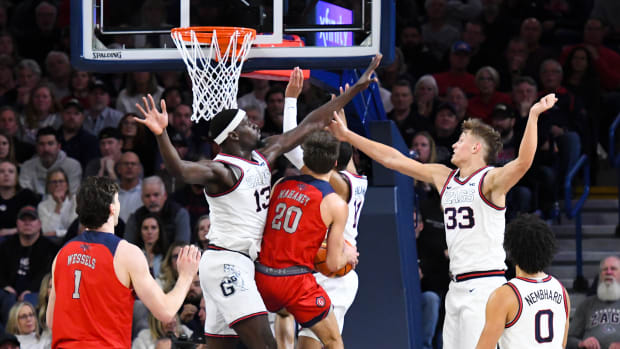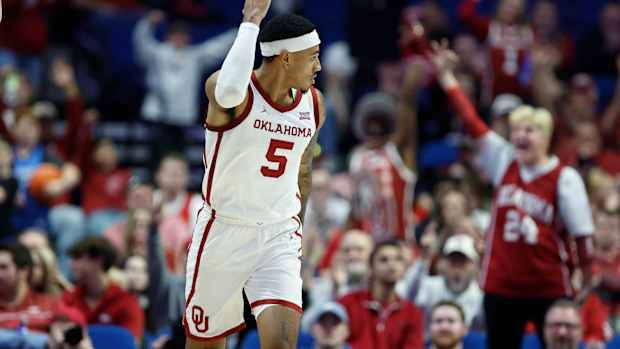Shootaround: Isaiah Cousins balances Oklahoma on the court, sets the soundtrack for the Sooners off it
NORMAN, Okla. — On Tuesday morning, Isaiah Cousins strolls across the Oklahoma practice floor eating a bagel, wearing a gray T-shirt and gray sweatpants. It is a very unadorned look, which suits his demeanor, if not his alternate identity. Around this gym he is known as DJ Fragga Benz, a stage name that synthesizes one of Cousins's other nicknames ("Frag," and more on that later) with that of a well-regarded Jamaican dancehall deejay, Spragga Benz. Maybe two years ago, Cousins says, he began mixing off a controller system—though not a classic turntable, it still allows Cousins to execute spin moves of a kind—and he has provided the soundtrack for gatherings with teammates and birthday parties. He once left his gear at Ryan Spangler's place, and the Sooners forward concluded that Cousins's music library contained every song known to man.
"I mean, I like it," Cousins says of the deejay side gig. "It's a little something where you can just have fun."
This is notable, because Cousins is not renowned for exuding fun. He says little away from the floor, and he has an acid tongue on it. He has slept on a practice facility couch, regularly, to better facilitate 7 a.m. workouts. He has a bullet in his shoulder. (Again, more on that later.) Watch him off the ball, and it's a remarkable thing: He often plays with his fists clenched. It's like Cousins is ready to fight even when a fight isn't coming. "I like his swagger, his motor, his drive," senior Buddy Hield says of his backcourt mate and roommate. "He's got that New York mentality that he just doesn't give anything up. He might make some corn-head plays and get a technical sometimes, but that's something you live with. Because he makes the team tougher."
This will be useful Saturday when Kansas visits, and Oklahoma attempts to exact vengeance upon the Jayhawks for the epic three-overtime 109–106 loss in Lawrence on Jan. 5. It will also be useful if Cousins performs as he has all year (13.6 points, 4.6 rebounds, 4.6 assists, 46.8% three-point shooting and team-low 12.9% turnover rate). The Sooners are peaking thanks to the four-year development of its core, and Cousins's transformation has been as significant as any: He arrived from Mount Vernon, N.Y., as a slashing guard with balky mechanics and is now an efficient, high-production performer who can carry the team if Hield can't.
His emotion can be both asset and curse, as evidenced in an 80–69 loss at Kansas State Saturday, when Cousins drop-kicked the ball after a foul call and fouled out on the resulting technical. Mostly, though, that energy is channeled to a purpose Cousins discovered in Norman. "The ability to run a team, to make it all about others—that's probably the biggest change," Oklahoma coach Lon Kruger says. "It wasn't that way [for him] growing up. It wasn't about others. Fend for yourself, look out for yourself. Now we're asking him to do the other extreme. Be responsible for everyone else, be considerate of everyone else, help everyone else, make it about others. Again, he's so competitive, he'll get flustered with others at times. But he's made big strides."
Per his teammates, Cousins often refers back to his formative years in Mount Vernon, a city that borders the Bronx and Westchester Country, noting the pickup games full of hard fouls and bereft of pity. Likewise, even though Mount Vernon has seen more than a 30% drop in the crime rate in the last decade, as recently as 2011, there were still 2,113 total crimes and 658 violent crimes committed in a city of 68,000 people, according to New York State statistics. And on May 27, 2014, Cousins was a bystander, at home during summer break, when a reported gang member began firing shots and a bullet hit the back of his left shoulder. (Cousins returned to full workouts a few weeks later, and as for the "Frag" nickname, he says he isn't familiar with the connotation of harming someone else, badly. "Somebody made it up, and they called me 'Frag,'" he says.)
That environment forged a hard shell. This explains what it is like to be a stranger conversing with Cousins for the first time. It is not a big deal that a New York kid found a way to thrive in Oklahoma. ("It could happen anywhere. Right timing.") It is not a big deal how much time he spends in the gym, that even as a freshman he logged more solo practice hours than upperclassmen. ("Nah, I gotta do what I gotta do.") It's not a big deal that he sleeps at the facility. ("It's just my bed is not that comfortable.") It is not a big deal that he occasionally flits between himself and DJ Fragga Benz. ("There's no difference.")
It is a big deal that Cousins is so competitive—Kruger likens him to current Oklahoma assistant Steve Henson, who felt compelled to win every drill when he played under Kruger at Kansas State from 1986–1990—though Cousins offers a minimalist explanation for that, too. "Just have something to prove," he says. "Because I'm good, and I want to show that I'm good."
We're left then to deduce how Cousins grew based on others' accounts. His remarkable improvement as a shooter—Cousins hit just 29.6% of shots as a freshman, and just 25% from long range—owes to good instincts for applying teaching points, in Kruger's estimation. When coaches moved his elbow or tried to limit the moving parts in his shot mechanics, Cousins made the changes and did not backslide. "If you talk about certain things on the shot, most kids will work on it while you're there," Kruger says. "But Isaiah has the ability to work on it all those hours he's in he gym by himself—transfer those mechanics, transfer the changes. That's not a common, easy thing to do."
Likewise Cousins's assist rate has climbed each year, from 13% as a freshman to 24.4% this season, and he has that career-low turnover percentage while sporting the second-highest usage rate (21.2%) on the team.
Sue Ogrocki/AP
And while it is difficult to quantify maturity, there is this: Cousins plays with Hield, the frontrunner for national player of the year honors, and has found a way to maximize both of their games. All eyes again turned to Hield on Monday after he scored Oklahoma's last 12 points to stave off Texas in a 63–60 thriller, including the dramatic game-winning three-pointer with 1.3 seconds left. Lost in that was Cousins's 17-point effort, including 3-of-5 shooting from three-point range, production that allowed for Hield's heroics.
This is, yet again, not a big deal for Cousins: He's a scorer and I'm the distributor, he deadpans. "You have to be secure with yourself," Kruger says. "Isaiah knows he's a good player. He knows he can do a lot of things Buddy can't do. And yet he wants to get the ball to Buddy at the appropriate time. Takes a secure person to do that."
Occasionally, the hard shell gives. After the win on Monday, the Sooners took their customary victory lap around the floor. Near the end of it, Cousins spied his good friend, Oklahoma student Kiara Sloan. He wrapped her in a hug, lifted her off her feet and smiled and shouted as he shook her up and down.
He indeed will talk, and at length, to those who he thinks deserve it: Against Texas, every made shot was worthy of running commentary to whoever was nearby. "That's why I like playing with him," Spangler says. "He's going to get in somebody's face."
Oklahoma knows its point guard cares intensely, and they prefer it that way. Even after Cousins punted the ball with 65 seconds left at Kansas State, Kruger's correction was more sympathetic than apoplectic: I know what you're feeling, he told Cousins, but that can't be the response. "He kind of missed [the ball] anyhow," Kruger says and smiles. The Sooners soak up all the emotional spillover, because they recognize how precious a resource it is.
Cousins looks loose behind those deejay controls, his teammates say, and he smiles the whole time. And that's great. They all like DJ Fragga Benz.
They need the guy who shows up after the music stops.
Grant Halverson/Getty
Starting Fives
The five best games of the weekend:
No. 6 Kansas at No. 3 Oklahoma (Saturday, 2:30 p.m., ESPN). Four overtimes? Eleven? Hield literally teleporting from one end of the floor to the other for a game-winner? I put nothing past this rematch.
No. 22 Kentucky at South Carolina (Saturday, noon, ESPN). In a battle of teams tied for first in the SEC, the Gamecocks have a chance to take down the SEC's leviathan program and set their path to the league title.
Gonzaga at No. 16 SMU (Saturday, 10 p.m., ESPN2). The Bulldogs could use a résumé-building win. Meanwhile, this is a prime proving-ground opportunity for a Mustangs team banned from the postseason and playing for little but the chance to show how much they deserve to play in March anyway.
No. 7 Virginia at Duke (Saturday, 4:30 p.m. ET, ESPN). The Cavaliers, once left for semi-conscious after losing three out of four ACC games, now have won seven in a row. The Blue Devils are staving off bubble talk, for now, but this game kicks off a brutal three-game stretch that continues with visits to North Carolina and Louisville.
No. 23 USC at No. 17 Arizona(Sunday, 8 p.m., FS1). The Trojans are in second place in the Pac-12 and they're young. They've already made statements thus far—see: two wins over UCLA—but a victory could be a truly impressive commentary on what third-year coach Andy Enfield is building.
The five best dive bars that I can recall visiting on my work travels over the years:
Tootsies. If there exists a better place to spend an evening in Nashville, especially one involving a band that covers Bon Jovi after a Bon Jovi concert, I would love to hear about it.
Ercoles. A cash-only beacon of bench seating and reasonably priced libations in Manhattan Beach, Calif. I do caution against (but simultaneously recommend) visiting with professional hockey writers.
Bourbon Street Distillery. An Indianapolis staple (ironically) featuring a juke box overflowing with '80s hair bands and a wealth of Osiris IPA on hand.
The Brazen Head. O.K., when you have live acts like Van Morrison pass through, you're probably not a honest-to-goodness dive. But it is the oldest bar in Ireland, est. 1198. And James Joyce mentioned it in Ulysses. And it's still serving in Dublin. Great job on the upkeep, all things considered.
El Bait Shop. It's as if someone said, "Where should we station taps for all known and good beers in this and every other universe? Got it: Des Moines."
(Sixth man: JT's Bar & Grill. A late-breaking entry from Phoenix. Notable for holiday lights in force in early January, Big West games on a tiny flat screen and, as my colleague Pete Thamel notes, the availability of the underrated INXS classic "Don't Change" on the juke box.)
Two on Two
Each week, The Shootaround will talk to a pair of assistant coaches for a brief scouting report on a key upcoming matchup. This week focuses on two of the Big 12's best point men: Iowa State's Monte Morris and Texas's Isaiah Taylor. The Cyclones and Longhorns meet on Saturday at 8:30 p.m. on ESPN.
Mike Morrell, Texas assistant coach: "(Morris) can really share the basketball, he's a good shooter, he lives in the lane. They're an older group who play well together, and he's probably the biggest reason. He gets everybody the ball, you can't help on to him too much because they have great shooters. As a team that likes to press, he presents a whole different arsenal of problems in that because he's very, very good in transition. He's hard to trap. He obviously takes very good care of the basketball and makes good decisions. He makes the easy play. Guys who take care of the basketball, that's what they do—he gets to the lane and makes the right play. When you've got guys around you that can make plays, you're not trying to force the issue. You have to try to keep him out of the lane, and obviously that's easier said than done with his quickness with the ball in his hands. If you can limit what he does in transition, that will help you. But they like to get it to the other end quickly, and he's the biggest reason for that, because of his speed."
T.J. Otzelberger, Iowa State assistant coach: "(Taylor's) speed and his burst are phenomenal. He is much more aggressive this year, he's looking to attack a lot more and going downhill. They're doing a better job spacing the floor, playing essentially with four guards—once [Cam] Ridley went down, they sort of settled on a four-out lineup. Makes him even tougher to guard that way. When it comes down the stretch, whether it's Oklahoma or any of those games, he's in attack mode and you can tell they have a lot of confidence in him. In transition, you have to slow the ball down, because he's so quick from end line to end line. You have to make sure you don't let him come at you with a full head of steam. When they're pressuring a little bit, it gives him more chances to play in the open floor. That's where he really thrives. When he gets advantage situations, four-on-three or three-on-two, when he gets his speed and burst in the open floor, he's really hard to stop. Them mixing and changing defenses definitely makes him even more of a weapon."
[video: 13724979]
Court of Opinion
I have many problems with postseason bans. Their effect seems arbitrary and anecdotal at best. So I propose this: Ban postseason bans. Even though his program is in NCAA crosshairs, Louisville coach Rick Pitino had the right idea when he originally went off on the organization after a win over Boston College last weekend: The only meaningful punishments impact a school's wallet. Start by banning the guilty coach from the next postseason, wherever he is, as well as half of the next regular season—without pay. Levy a hefty general fine on the school. Assert that the program forfeits all revenue/NCAA tournament units for its next three or four or five appearances. Yes, that adversely affects the payout to other schools within the same conference, but I wouldn't consider them innocent bystanders. Maybe that action would inspire the league members or conference office to take some more responsibility.
It's not a perfect plan. If you preserve the NCAA tournament experience of the players, the guilty program benefits from the exposure anyway. But going after the money seems like a better approach than the infuriatingly cynical one we see too often now.
Traveling Calls
Should you find yourself in Cincinnati, before an hour and a half of driving, do not eat lunch at Gordo's. Most certainly do not order the GFat burger, because what will arrive is a patty the approximate density of an anti-tank mine, and it will be covered in BBQ pulled pork, cheddar cheese and topped with an onion ring. And, for the love of all things, do not bite into the GFat. Because you will not stop until it has vanished. And through the haze of delight, you will remember that you cannot take a nap.
But you may do all this, blamelessly. And you may survive your drive, and you may somehow find yourself hungry for more. And you may ride into downtown Lexington, Ky., only to see signs for elevated parking rates. You'll ask someone what the fuss is. And you will hear words that horrify you, sending bolts of loathing deep into your marrow. All that was bright will seem dark and hopeless.
"Mamma Mia! is at the opera house."
After the convulsions subside, you will wander into The Village Idiot. There, you'll order a Six Point High Res double IPA, and the duck and waffle dinner. And you'll be saved, rescued from the plague descended upon this town. You'll be satisfied knowing that, in the end, the dinner takes all.
